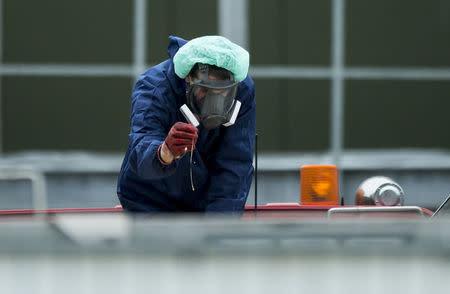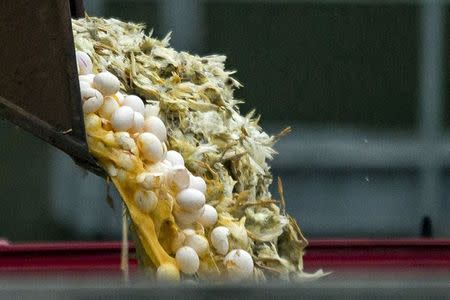Intensive Dutch animal farms seen vulnerable to disease
By Thomas Escritt AMSTERDAM (Reuters) - Agriculture has helped make the Netherlands rich, but experts warn that the density of farms and the increasing number of animals in one of the most intensive agricultural sectors in the world make it vulnerable to diseases. The discovery last Sunday of a highly infectious strain of bird flu at a Dutch farm forced officials to impose a three-day lockdown on the transport of all poultry and related products. But the transport freeze, which cost the industry 100 million euros ($120 million), did not stop the discovery of similar or identical strains at two nearby farms, forcing the already expensive halt to be extended to a full week. "When there is a disease in the Netherlands, which is the country in the world where the concentration of farms is the highest, be it for poultry or pigs, it hurts," said Bernard Vallat, head of the World Organization for Animal Health. "The Netherlands are really vulnerable because of this density (of farms)," he told Reuters. Dutch agriculture defends its practices, with the poultry industry pointing out it has invested hugely in hygiene since the last bird flu epidemic 11 years ago. While the industry has become an incredible source of wealth -- agriculture amounted for 16 percent of 2013 exports -- efficiency has come at a cost. Experts said having so many farms and animals packed together has made the system highly vulnerable to disease. The farming industry runs at a rate that even the transport lockdown could not stop. In three days, around 7.5 million chicks hatched in incubation warehouses with nowhere to go. The latest infection of bird flu -- the ninth animal epidemic in the Netherlands in less than 20 years -- has already forced the culling of more than 200,000 birds. "It's this most amazing logistical system," said Clemens Driessen, a bioethicist at Wageningen University, a leading agricultural research center. "But as soon as you say you can no longer transport the animals, it all starts to unravel." Since 1997, 40 million hens, cows, goats, pigs and sheep have been slaughtered to contain outbreaks including swine flu, foot-and-mouth and "mad cow" disease. The Netherlands is the world's second largest agricultural exporter after the United States, selling more than 79 billion euros ($98 billion) worth of goods abroad last year. It is the world's leading egg exporter and largest supplier of poultry meat in the European Union. 103 MILLION CHICKENS High-intensity farms house millions of animals -- 103 million chickens, 12 million pigs, 4 million cows and millions more sheep, turkeys, ducks, rabbits and goats. New technology has brought massive strides in productivity, with advances in the vast warehousing systems that hatch, feed, and water broiler chickens. The average number of hens per hatchery has doubled in 13 years, according to Statistics Netherlands, while the cow population has risen by a half to 1.5 million. There are now 83 cows per farm, up from 51 in 2000. The country's pig population, at 12 million, has changed little from 13 years ago, but the average number of pigs per farm has almost doubled to 2,200. The density is at its highest in the south east of the country, where at least 20 million chickens are found in a district called De Peel. Animal welfare groups say conditions go beyond being morally objectionable and that the farming practice has become an incubator for disease. "The intensive conditions in factory farming provide a pressure cooker in which diseases like avian flu can spread very easily and can also evolve very easily," said Geert Laugs, Netherlands director at pressure group Compassion in World Farming. Geert Jan Oplaat, president of the Poultry Farmers' Association, disagreed. "A chicken is seven times more at risk of flu if it goes outside," said Oplaat. "It's almost irresponsible to keep chickens outside during a high flu-risk period." But unease is also reflected in the shopping -- and voting -- habits of the Dutch. The Netherlands in 2006 elected the first animal rights party in the world into parliament. Party for the Animals leader Marianne Thieme has no doubt that the treatment of farm animals helped win her party the 120,000 votes needed to win its two seats. "You have an industry focused on keeping the costs as low as possible, giving as little feed as possible," she told Reuters. "We don’t see animals as animals any more but as products." Demand is also increasing for meat from free range farms, with Albert Hein, the country’s largest supermarket, and its competitors advertising more organic produce. "We've been waiting for this," said Hanneke van Ormondt of animal rights group Wakker Dier. "We've been saying for ever there's too many animals in the Netherlands, too much transportation, too big a scale." (Additional reporting by Sybille de la Hamaide in Paris; Editing by Anthony Deutsch and Giles Elgood)


